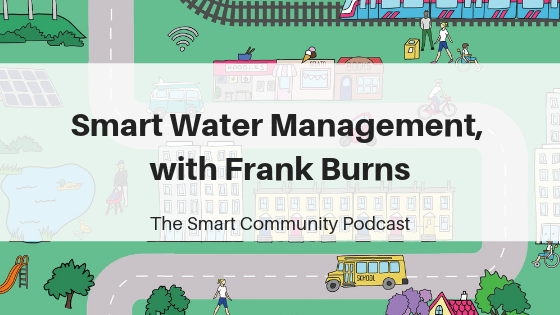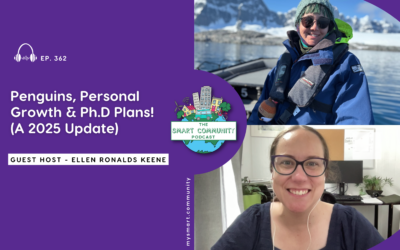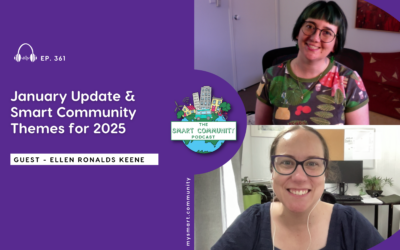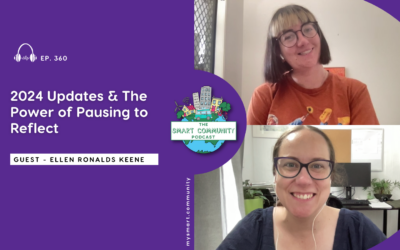In this episode of the Smart Community Podcast, I had a great conversation with Frank Burns, President and Co-Founder of APANA, a technology company that is currently applying its IoT and Prescriptive Analytics suites to solve problems with water use inside the built environment. Frank shares his background in waste water management, his passion for eliminating water waste and contamination in the commercial, industrial and institutional sector, and how it sparked his interest in the Smart Cities/Smart Communities space. We discuss the way APANA uses technology and data for Smart Water Management, and why it’s so important not only in individual companies but at the city level. Frank shares his thoughts on how this is currently happening in the US, the tug of war between the tech-focused approach and the bottom-up approach to Smart cities and why meaningful measurement is the key to integration and collaboration across sectors and disciplines. We finish our chat talking about water being the emerging trend that we’re not talking about enough, and how using IOT measurement and data analysis can be a security system against mechanical failure and human error in the Smart Water space. As always, I hope you enjoy listening to this episode as much as I enjoyed making it.
Listen here:
What we cover in this episode:
- Frank’s passion for eliminating water waste from the use profile in the built environment
- How he became involved in this space 20 years ago
- What sparked Frank’s interest in the Smart City space
- The technology Frank’s company uses for Smart Water Management
- Why reducing the unnecessary water use and contamination in cities is the lowest hanging fruit in regards to reducing energy consumption
- The tug of war between the tech-focused approach and the bottom-up approach to Smart Cities in the US
- Projects Frank and his company APANA are currently working on
- Why we need to measure—and have measurements that are accurate and at a resolution that’s meaningful—in order to collaborate and integrate
- The emerging trend of Smart Water Management and why Frank things it should be the new recycling
- Using IOT measurement and data analysis as a security system against mechanical failure and human error
Quotes:
I am passionate about eliminating water waste from the use profile in the built environment, and I got into this because I designed and built waste water plants for commercial centres.
We started seeing the waste water plants were receiving a lot more water in some locations than the design had projected, and we began to look up stream into the buildings on that campus and realised there were a number of mechanical failures and human waste activities that created a lot more water use than was necessary.
You can see things when you measure in high resolution in real time, you can see all kinds of stuff…all of the failure points.
Cities own all these [water meter] assets and they’re not connected. They’re using it primarily for the purpose of billing water. If you measured in a really meaningful way at one-minute intervals and had the technology to process that data and make good use of it, it’s a whole other level of value…not just waste control.
[A Smart City] is where the things that make sense are connected, and the data is useful. You can monitor and measure all kinds of things, but a lot of it doesn’t make sense to do. A Smart City is taking the stuff that means something and getting that data back so that it can be processed, turned around and made useful to either the automation system for the people who can act on it, from either an immediate intervention or general reporting perspective.
We see a tremendous potential for making water systems significantly Smarter…You could connect every house, but the things that really make sense immediately in side of most first world cities is the commercial, industrial and institutional sector properties because they have tremendous water use and that’s where most of the problems are.
The number 1 consumer of electricity in most first-world cities is the municipal waste water treatment plant. We tend not to think about it [because it’s out of sight, out of mind]. From a Smart City perspective, I think the lowest lying fruit as far as built environment is to reduce the unnecessary water use and contamination that hits our waste water plants. That would have an immediate reduction on our energy consumption at the largest energy user in most of our cities. The Smart City approach to Smart Water Management is the most practical, fastest way to accomplish that.
We call it manage water like inventory, because people understand how to manage inventory really well. We out to be managing water like that. And so we want to push that paradigm from a city level, where it will have an immediate and lasting reduction of the waste profile. It’s the easiest way for us to reduce the energy consumption by capacity in our distribution and wastewater treatment facilities.
At the end of the day, the Smart City is basically management. You’re collecting data, so you can make sense of it, and you can take some sort of action and control—manage—and get a result that is beneficial for the community.
You’ll have measurement that will manage and keep it transparent, and when things go sideways, people will know. And if they decide not to fix it, there’s an enforcement mechanism that will be enabled that will help the community contain the waste. When you measure and report in a way that is meaningful, humans tend to respond really quickly.
We need measurement that is accurate and at a resolution that is meaningful…When there’s no hiding and there’s total transparency and it’s obvious to everybody because it’s there, then collaboration and all of the discussion points becomes pretty simple.
I think eliminating water waste, unnecessary water use and unnecessary contamination should be the new solid waste recycling. People are vigilant about recycling…but when you look at how water is used, and the impact, it’s out of sight and out of mind. We haven’t even applied our brain to that part of our resource consumption and impact on the environment.
If we measure water in a meaningful way and connect it at scale, it’s very inexpensive, but it provides this security against [operational failure]…you end up with an ability to know what’s happening, pinpoint it, classify it…and guide somebody on what to do when it happens. That’s what a Smart City will look like.
Connect:
Connect with Frank via the Apana website
Connect with me via email: hello@mysmart.community
Connect with My Smart Community via LinkedIn or Twitter and watch on YouTube
Podcast Production by Perk Digital






0 Comments